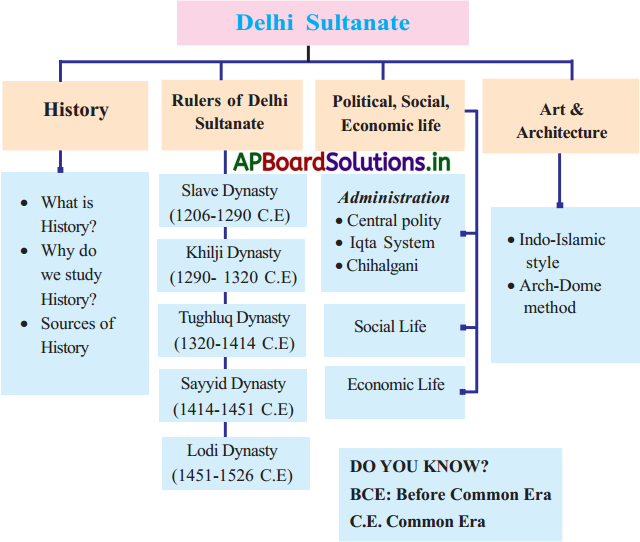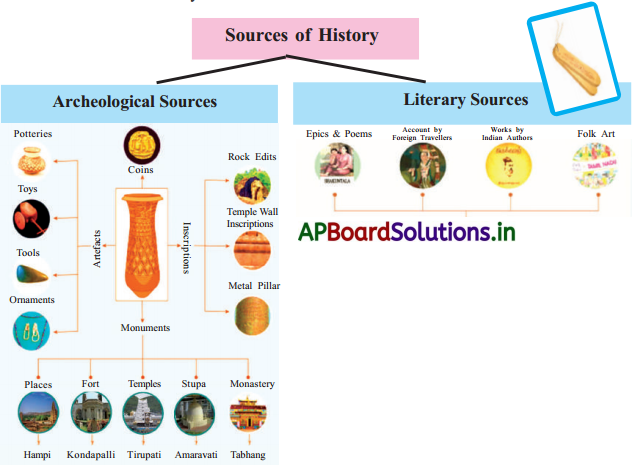Students can go through AP Board 7th Class Social Notes 4th Lesson Delhi Sultanate to understand and remember the concept easily.
AP Board 7th Class Social Notes 4th Lesson Delhi Sultanate
→ History is considered as the record of the past factual events.
→ We have to study History as it reveals how the people lived in that society, their rules and regulations, cultures and traditions in a chronological order i.e., from past to present.
→ The sources of History are broadly classified into two categories. They are: 1. Archaeological Sources which include material remains and 2. Literary Sources which include all texts.
→ Tomara or Tomar Rajputs built Dhillika or Dhillika pura (modern day Delhi) and made it capital of their kingdom.
→ Delhi became an important commercial centre under the Tomaras and Chauhans.
→ Muhammad Ghori defeated Prithviraj Chauhan at Tarain in 1192 CE. and occupied Delhi. Jl The Slave dynasty was established by Qutbuddin Aibak in 1206 CE.
![]()
→ lltutmish was the first sovereign ruler from Delhi and the real founder of the Delhi Sultanate.
→ Sultan Raziyya was the only woman ruler of Delhi Sultanate.
→ Alauddin Khalji was the successor of Jalaluddin Khalji.
→ Ghiyasuddin Tughlaq was the founder of Tughlaq dynasty.
→ Muhammad bin Tughlaq changed the capital from Delhi to Devagiri (Daulatabad).
→ The Sultan was the head of the empire.
→ Delhi Sultanate was divided into Iqtas (provinces).
→ Agriculture was the main occupation.
→ Tanka (silver) and Jital (copper) were the basic coins in usage.
→ A combination of Arabic and Indian style of art and architecture developed during this period.
→ Qutub Minar was built by Qutubuddin Aibak.
→ Literature was produced in Persian, Sanskrit and other regional languages.
→ Alberuni, Amir Khusrav and Zia-ud-din Barani were some of the great scholars.
→ The rule of the Delhi Sultanate came to an end during the reign of Lodi dynasty.
→ The Mughal ruler, Babur defeated Ibrahim Lodi in the first battle of Panipat in 1526 A.D.
![]()
→ What is History? : History is considered as the record of the past factural events.
→ Why do we study History? : We have to study history as it reveals how the people lived in that society, their rules and regulations, cultures and traditions in a chronological order i.e., from past to present.
→ Sources of History : 1. Archaeological sources. 2. Literary sources.
→ Rulers of Delhi Sultanate : Various Muslim dynasties that ruled in India.
→ Social, Political and Economic life
Social : The way that laws, government actions, events etc.
→ Political : With the leading officials, their interactions, any documents, laws, treaties etc.
→ Economic life : Specific to the financial implications of laws and events, how they affect trade, job availability and the flow of money.
→ Art and Architecture : Is defined as the art and science of designing building and structures.
(OR)
A combination of Arabic and Indian style of art and architecture developed during that period.
![]()
1. Dynasty : A line of hereditary rulers.
2. Proclaimed : Officially announced.
3. Couplets : Two lined verses of same rhyming and length.
4. Karkhanas : Workshops.
5. Shariat : Rule according to Islamic principles.

